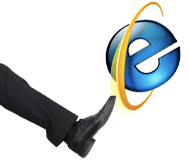 Mozilla’s Firefox 1.0 officially became available on November 9th, 2004–which means that the Little Browser That Could officially turns five today. It’s not the world’s dominant browser–while market share estimates vary widely, all show that Internet Explorer still has a sizable lead–but it’s surely the most beloved browser on the planet.
Mozilla’s Firefox 1.0 officially became available on November 9th, 2004–which means that the Little Browser That Could officially turns five today. It’s not the world’s dominant browser–while market share estimates vary widely, all show that Internet Explorer still has a sizable lead–but it’s surely the most beloved browser on the planet.
(It’s definitely the dominant browser in the Technologizer community–around 40 percent of visits have been made using it this month, via 28 percent with IE, 18 percent with Safari, and nine percent with Chrome.)
In celebration of Firefox’s first half-decade, here are some quick reflections on why it’s one of the most significant software products of this or any other era:
1. It reignited the browser wars. Back in 2004, Internet Explorer had more than ninety percent of the market and seemed to be on its way to as close to 100 percent as any product could conceivably attain. Other alternative browsers, such as Opera and earlier versions of Mozilla, had market shares that looked like rounding errors. Then Firefox appeared and quickly gained traction. Its strategy for success was a clever one: It was just a good browser, period. And today, there are more significant browsers than during any period since the inception of the Web: IE, Firefox, Safari, Chrome, Opera, and the Firefox variant I have a soft spot for, Flock. There’s probably some alternate world in which Firefox didn’t come along, IE’s market share is still monopolistic, and the Web is a much less interesting place.
2. It helped enable powerful Web apps. The leading browser of the pre-Firefox era, IE 6, was notoriously, willfully contemptuous of Web standards. Writing sophisticated Web-based applications such as e-mail clients that work with it was an exercise in frustration, albeit one which any company that wanted to write such apps had to go through. But Firefox set a good example by adhering to standards such as CSS and JavaScript that enable today’s Web apps. And Safari (which predated Firefox), Chrome, and even IE 8 all get it, too.
3. It’s the most mainstream open-source project to date. Linux is a remarkable accomplishment, but its domain remains servers and geeks who are passionate about software. Firefox showed the open-source community could build something that appealed to just about everybody–including folks who have no idea what open-source software is.
4. It’s spurned bloat. In many ways, today’s Firefox 3.5 doesn’t feel radically different from 2004’s Firefox 1.0. That’s a good thing–Mozilla has added features sparingly and avoided the temptation to lard its browser up with “improvements” that mostly add clutter. Instead, it offers one of the richest platforms for add-ons that the software world has ever known, allowing every Firefox user to build a browser that has exactly the features that he or she wants.
5. It gave the Netscape story an unexpectedly happy ending. The tale of the once-mighty Netscape Navigator was a sad one, whether you believed that its fall was due to unfair tactics by Microsoft or self-inflicted wounds (or a bit of both). By 2004, Navigator appeared to be well on its way to irrelevance. But Firefox, which exists only because of Netscape’s long-ago decision to open-source its code, is in effect the next-generation Navigator. With all due respect to F. Scott Fitzgerald, its success shows that there are indeed second acts in American lives. At least if the American in question happens to be a piece of software.
No, Firefox isn’t perfect–if I get a moment, I’ll write about five challenges it faces–but its huge influence made the world a better place. Even if you use IE or one of its other competitors.
Your thoughts, celebratory or otherwise?

 Internet Explorer 8 is a
Internet Explorer 8 is a  Looks like any lingering question about the European Union’s antitrust case against Microsoft
Looks like any lingering question about the European Union’s antitrust case against Microsoft  Google is boasting that an update to Chrome’s V8 JavaScript engine and Webkit browsing component has yielded a significant
Google is boasting that an update to Chrome’s V8 JavaScript engine and Webkit browsing component has yielded a significant  Ars Technica’s Ryan Paul has posted a
Ars Technica’s Ryan Paul has posted a  TechCrunch’s Michael Arrington (who’s back from his month-long blogging hiatus) is reporting that
TechCrunch’s Michael Arrington (who’s back from his month-long blogging hiatus) is reporting that  Once again, those wacky Europeans are making life difficult for Microsoft. A site called EurActive is reporting that Microsoft’s ongoing antitrust tussle with the European Commission will result in the company being forced to
Once again, those wacky Europeans are making life difficult for Microsoft. A site called EurActive is reporting that Microsoft’s ongoing antitrust tussle with the European Commission will result in the company being forced to  “Soon, Majority of Web Users Will No Longer Use IE.” That’s the
“Soon, Majority of Web Users Will No Longer Use IE.” That’s the